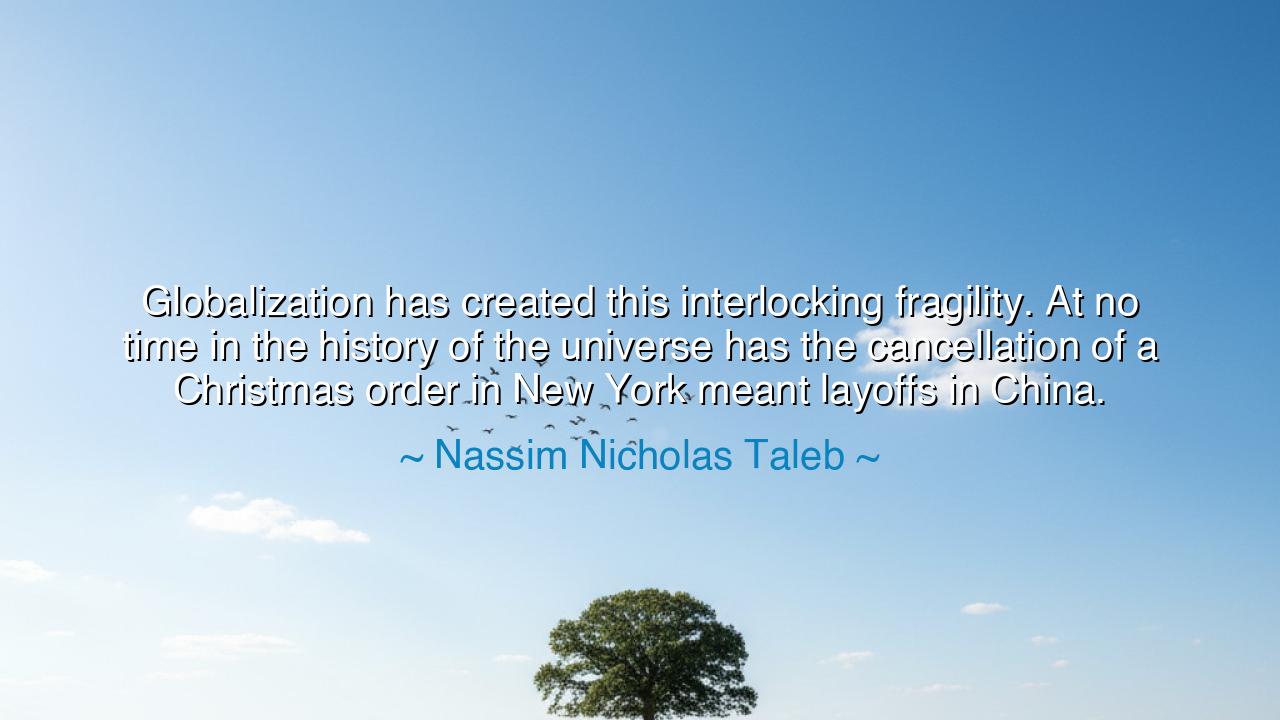
Globalization has created this interlocking fragility. At no time
Globalization has created this interlocking fragility. At no time in the history of the universe has the cancellation of a Christmas order in New York meant layoffs in China.






Host:
The room was still, the light from the lamp casting a soft glow across the space. Jack sat at the table, his fingers resting on a cup of tea, lost in thought. Jeeny, sitting across from him, was flipping through a book but seemed distracted, her mind clearly focused elsewhere. The atmosphere felt quiet, yet full of unspoken curiosity, as if a deeper conversation was waiting to emerge.
Jeeny:
(She sets her book down gently, her voice thoughtful, almost probing.)
“I came across a quote by Nassim Nicholas Taleb today. He said, ‘Globalization has created this interlocking fragility. At no time in the history of the universe has the cancellation of a Christmas order in New York meant layoffs in China.’ It really made me think about how interconnected our world has become, but also how fragile it is. Do you think globalization has made our systems more vulnerable in ways we didn’t expect?”
Jack:
(He looks up, his expression reflective, clearly processing the gravity of the quote.)
“Absolutely. Globalization has created this vast web of interconnectedness, where decisions made in one part of the world can have ripple effects far beyond what we can imagine. At first, it seems like a good thing — trade, communication, and growth all expanding. But Taleb’s point highlights the hidden risks that come with that interconnectedness. When everything is so linked together, even a small disruption can trigger major consequences. What seems like a small issue in one place — like a canceled order — can lead to job losses or economic hardship elsewhere.”
Jeeny:
(She nods, her voice gentle, almost coaxing him to dive deeper.)
“Exactly. It’s like the more connected we are, the more dependent we become on each part of the system working perfectly. And when something goes wrong — even in one corner of the world — the impact is amplified, like a domino effect. We often don’t think about how our actions can impact someone halfway across the world. Globalization has made the world smaller in some ways, but also more fragile in others.”
Jack:
(Smiling slightly, his voice more engaged, as he begins to understand the complexity of the issue.)
“It’s like we’re constantly creating these systems that are more efficient, but at the same time, they’re more prone to failure. In the past, a mistake in one country might have been contained to that country. But now, with the way economies are intertwined, the smallest disruption — like a supply chain issue or a political decision — can trigger a chain reaction globally. We’ve built systems where the fragility is hidden beneath the surface, and we don’t realize how dependent we’ve become on everything working perfectly.”
Jeeny:
(She smiles softly, her voice calm, offering a reminder of a larger truth.)
“That’s it. We’ve built a world that’s incredibly efficient, but efficiency doesn’t always equal resilience. The more interconnected we become, the harder it is to see the risks — until they happen. Taleb’s quote is a reminder that, while globalization has brought us closer, it’s also made us more vulnerable. Small disruptions, things that used to be local or manageable, can now have a much larger and more widespread impact.”
Jack:
(Sitting back slightly, his voice softer, almost like he’s internalizing the broader idea.)
“It’s a double-edged sword, isn’t it? The benefits of globalization are clear — more access, more growth, more opportunities. But with that comes a new kind of vulnerability, one that we didn’t have to face before. It’s easy to overlook those risks when everything seems to be running smoothly, but it only takes one disruption to see how fragile the system really is.”
Jeeny:
(She nods, her voice gentle, filled with quiet understanding.)
“Yes, and the challenge is in finding a balance. Globalization can bring people together, but we also need to be mindful of the potential weaknesses in the system. Resilience needs to be built into the way we operate, not just efficiency. When we can see the interconnections and the potential for disruption, we can better prepare for the unexpected. It’s about creating systems that are strong enough to withstand the inevitable disruptions.”
Host:
The room feels a little quieter now, as both Jack and Jeeny sit in shared contemplation of Taleb’s insight into globalization. The world outside continues its rhythm, but inside, there’s a deeper understanding that while globalization brings many benefits, it also creates a hidden fragility. The more interconnected we become, the more vulnerable we are to disruptions that ripple across the globe. In a world built on efficiency, the true challenge may be learning to build resilience into our systems — and to recognize that change, however small, can have far-reaching effects.






AAdministratorAdministrator
Welcome, honored guests. Please leave a comment, we will respond soon